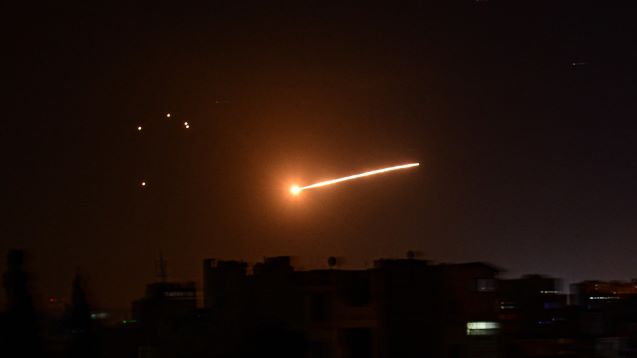Israeli strikes targeted Syria’s two main airports on Thursday, Syrian state television said, in the first such attack since a Hamas assault on Israel at the weekend triggered fierce fighting.
“Israeli aggression targets Damascus and Aleppo airports,” the state television reported on the messaging app Telegram, without providing additional details.
Israeli strikes have repeatedly caused the grounding of flights at the airports in Aleppo and the capital Damascus, both of which are controlled by the government of war-torn Syria.
The latest strikes came came as US Secretary of State Antony Blinken visited Israel, and hours after Iranian President Ebrahim Raisi, in a telephone call with his Syrian counterpart Bashar al-Assad, called on Arab and Islamic countries to cooperate in confronting Israel.
Meanwhile, Israel vowed to completely destroy Hamas. Just ahead of Blinken’s trip, Washington urged its ally to show restraint in its response to Hamas’s surprise attack — the worst in the country’s 75-year history — which Israeli forces said killed more than 1,200 people, mostly civilians.
Blinken vowed on a visit Thursday that the United States will “always” back Israel but said the Palestinians also have “legitimate aspirations” not represented by militant group Hamas.
“You may be strong enough on your own to defend yourself,” Blinken said during a meeting with Prime Minister Benjamin Netanyahu as war raged between Israel and Hamas.
“But as long as America exists, you will never, ever have to. We will always be there by your side.”
In Gaza, officials have reported more than 1,200 people killed in Israel’s uninterrupted campaign of air and artillery strikes, while the UN said more than 338,000 people have been displaced.
“Every Hamas member is a dead man,” Israeli Prime Minister Benjamin Netanyahu said in a televised statement on Wednesday, likening the militants to the Islamic State group and promising: “We will crush them and destroy them as the world has destroyed Daesh.”
For days, black smoke has billowed into the sky above the impoverished Palestinian enclave of 2.3 million people, where entire city blocks have been razed.
As the war rages on, fears are growing over the fate of at least 150 hostages — mostly Israelis but also foreign and dual nationals — held in Gaza by Hamas.
The militants claimed that four captives died in Israeli strikes and threatened to kill the others if civilian targets were bombed without advance warning from Israel.
Hamas claimed Wednesday to have released an Israeli woman and her two children who it said had been detained during fighting with Israeli forces, but Israeli television networks rejected the announcement.
Israel has massed forces, tanks and other heavy armour around Gaza after what Netanyahu called “an attack whose savagery… we have not seen since the Holocaust”.
US President Joe Biden pledged to send more munitions and military hardware to Israel, underscoring firm support for its ally in a conflict that has killed at least 22 US citizens.
Washington has diverted an aircraft carrier battle group to the eastern Mediterranean, and offered another carrier if needed.
But Biden has also called for restraint, telling Netanyahu it was “really important that Israel, with all the anger and frustration… they operate by the rules of war”.
To Israel’s enemies — states or groups — Biden issued a stern warning not to get involved, saying he “made it clear to the Iranians. Be careful”.
Iran has long financially and militarily backed Hamas but insists it had no involvement in Saturday’s assault.
Israel appeared to be readying for a possible ground invasion of Gaza, but also faces the threat of a multi-front war after also coming under rocket attack from militant groups in neighbouring Lebanon and Syria.
Israel again struck targets Wednesday in southern Lebanon, an area controlled by the Iran-backed Hezbollah.
On Wednesday evening, rocket sirens sounded across Israel’s north, and the army said there was a suspected aerial “infiltration” from Lebanon. It later backtracked, blaming an “error”.
Frantic diplomacy has continued as international and regional powers seek to prevent a wider conflagration in the Middle East.
In a phone call, Saudi Arabia’s de facto ruler Crown Prince Mohammed bin Salman reportedly told Iran’s president that Riyadh was “communicating with all international and regional parties to stop the ongoing escalation”.
Heavy bombardments have relentlessly rained down on Gaza, where at least 2,540 housing units have been levelled or rendered uninhabitable, according to the Gaza Ministry of Public Works and Housing.
Rubble, burnt-out cars and broken glass cover the roads in Gaza City, where bombs struck the Hamas-linked Islamic University.
Concern is rising over the worsening humanitarian crisis in the long-blockaded Palestinian enclave, where Israel has now imposed a total siege, cutting off water, food and energy supplies.
The enclave’s sole power plant shut down Wednesday after running out of fuel, Gaza’s electricity provider said.
And medical supplies, including oxygen, were running low at Gaza’s overwhelmed Al-Shifa hospital, said emergency room physician Mohammed Ghonim.
The European Union called for a “humanitarian corridor” to allow civilians to flee the enclave’s fifth war in 15 years, while Arab League foreign ministers meeting in Cairo called for aid to be allowed into Gaza “immediately”.
Gaza resident Mazen Mohammad, 38, said his terrified family spent the night huddled together as explosions shook the area, before emerging in the morning.
“We felt like we were in a ghost town, as if we were the only survivors,” Mohammad told AFP.
Unrest has also flared in the occupied West Bank, where protests have been held in solidarity with Gaza and 27 Palestinians have been killed in clashes since Saturday.__Daily Hurriyet





